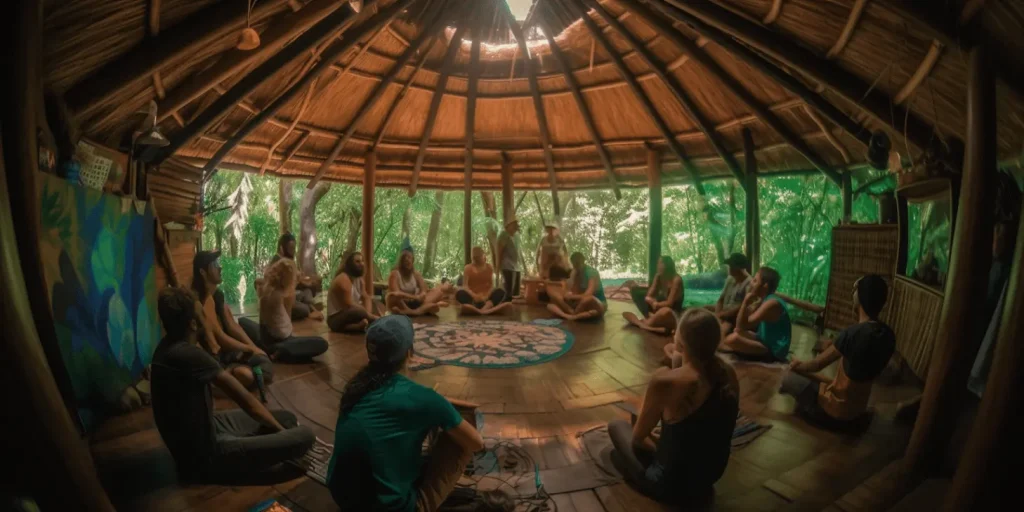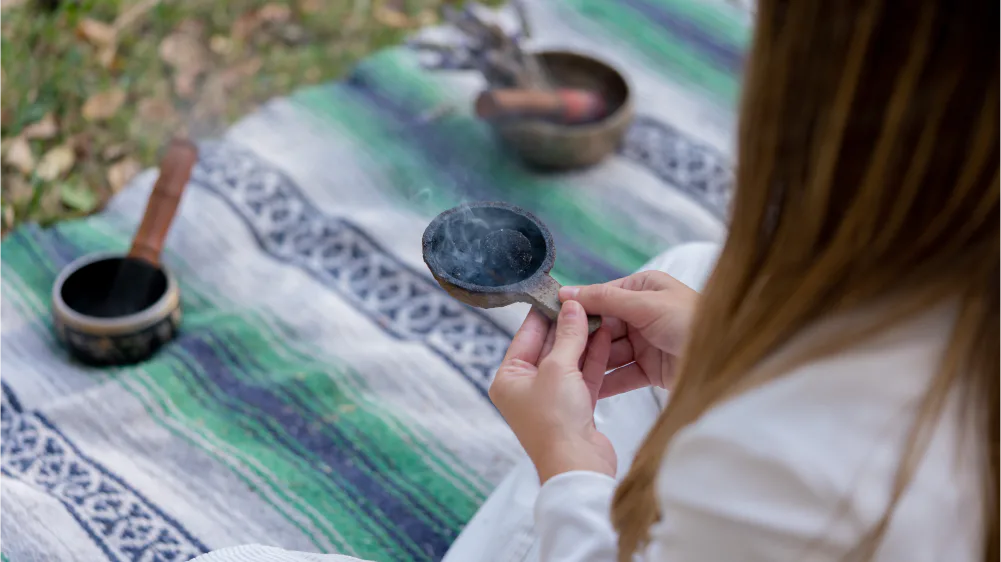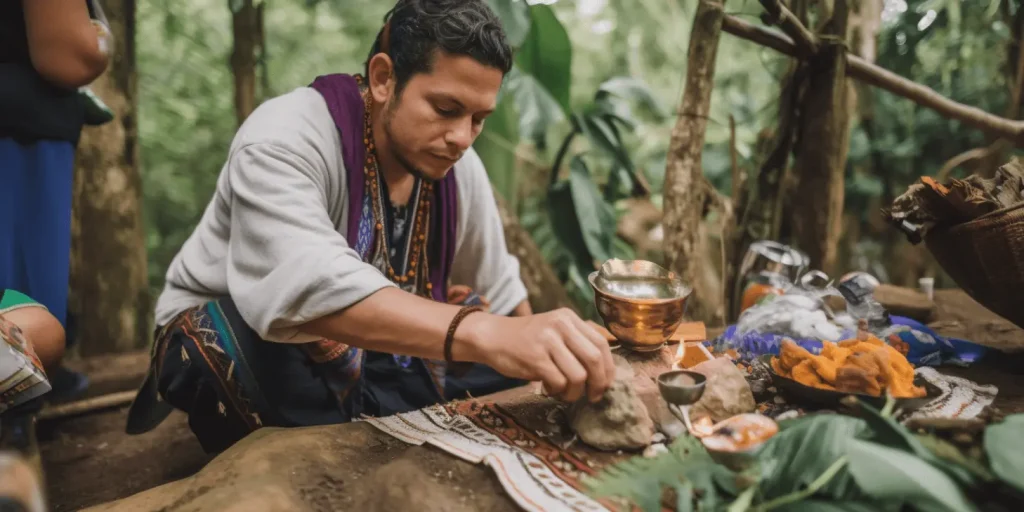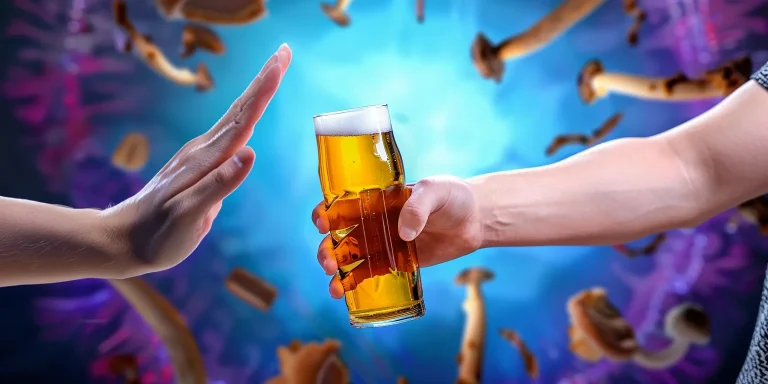The first time I attended an ayahuasca retreat, it was, for all practical purposes, a mess. The whole thing seemed rather improvised, packing way too many people into too small a space, with little to no preparation for all sundry. In order to take the medicine, a disorganized line of participants had to stumble through a dark garden full of obstacles — I tripped into a pond. To make matters worse, the ayahuasca itself was poorly concocted. One highly experienced attendee later told me that the consistency was all wrong — way too watery. As a result, in my case, it had a disappointingly weak effect. At the ceremony’s conclusion, the dubious shaman uttered a few magic words before racing to the airport to jet to another retreat, and that was that.
Two years later, I gave an ayahuasca retreat another try under radically different circumstances, which resulted in a significantly more profound experience. Now there were only a handful of attendees. The space where we gathered was comfortable and safe, and our guide opened the ceremony with a detailed explanation of what was to come, followed by a group discussion about what had brought us there. The psychedelic medicine was well-made and well-measured—no problems with blasting off this time—and once we’d all more or less come down, we discussed our journeys and how they might be integrated into our everyday lives. The whole process was warmed by a glow of compassion.
It was among the most powerful experiences of my life.
Psychedelic Tourism Goes Mainstream
With psychedelics finding a legal foothold in the states of Oregon and Colorado and cities across the United States, these two disparate ayahuasca experiences speak to what should be a central concern for psychedelic advocates everywhere.
Keep Up with Psychedelic Trends
Don’t miss the latest psychedelic news, events, companies, and more.
We respect and protect your privacy. By subscribing your info will be subject to our privacy policy. Unsubscribe easily at any time

How can we ensure that psychedelic retreats, ceremonies, and therapy clinics don’t become a milquetoast touristic cash grab? Psychedelic tourism — long relegated to the few countries around the world that had legalized the stuff in some form, such as Jamaica and Peru — is on the rise. As anyone who has ever visited a tourist attraction knows, they don’t always deliver the most authentic of experiences.
To examine this issue, I spoke with a large-scale psychedelic retreat, a retreat attendee, and a private ceremony provider about the key things psychedelic businesses and their patrons should keep in mind as we venture into the future of the emerging psychedelic tourism industry.
Justin Townsend, CEO of MycoMeditations
MycoMeditations is one of the world’s most established psychedelic retreat programs, offering a variety of psilocybin-assisted wellness programs out of its location in Jamaica.(1)
According to company CEO Justin Townsend, the biggest challenge inherent in establishing a trusted and effective psychedelic industry is the lack of trained clinicians fueled by a dearth of training opportunities. He explained that, “Research forecasts point to an estimated shortage of 30-50,000 trained psychedelic clinicians over the coming years. The majority of current training is classroom-based, videos, and role-play only, and this alone is highly inadequate in providing practitioners the experience they need.”
He went on to say that the typically illegal nature of psychedelics makes it difficult to impossible for practitioners to gain real-world experience. Prohibition also bars businesses from access to essential tools like banking and insurance.
In order for psychedelic companies to find success while helping to build trust in the growing space, Townsend asserts that they must offer — and clients must demand — “consistently high standards for safety and treatment protocols.” Adding, “Do this even if your competition isn’t. Even if your local state government sets a low bar for safety and standards, aim to exceed this. Do not sacrifice safety, quality staff, or guest experience for the sake of the bottom line.”
Keep Up with Psychedelic Trends
Don’t miss the latest psychedelic news, events, companies, and more.
We respect and protect your privacy. By subscribing your info will be subject to our privacy policy. Unsubscribe easily at any time
Townsend says that to achieve this, psychedelic businesses must prioritize staff training and self-care, provide a detailed guest application and screening process to ensure safety (MycoMeditations, for example, accepts less than a third of applicants), and respect the power of psychedelic substances.
“Always expect and train for the unexpected — it can and will happen,” he explained. Adding, “Psychedelics are not for everyone.”
Sonja Nakhai, Retreat Attendee
With little to no experience with psychoactive drugs, Sonja Nakhai decided to participate in an ayahuasca retreat at the suggestion of her partner, who described the ceremony he attended as “the most beautiful experience of his whole life.” After plenty of research, she signed up for a retreat in Finland.
She reports that on the first day, the pre-ayahuasca rapé (a powdered tobacco snuff that is blown up the nasal passages) made her too ill to keep the medicine itself down. However, during the second day, she fasted and passed on the rapé, which made ingesting the ayahuasca easier.

“I was not quite prepared for that intensive experience,” she admitted, “going back to my earliest childhood — about the age of one or one-and-a-half years — and realizing the cause of the issue that had been troubling me.” Challenging as the experience may have been, Nakhai explained that it pushed her to examine why she is so reactive to certain circumstances.
“A lot of insights,” she summarized. “No negative outcomes.”
Nakhai explained that she appreciated how “the facilitator was deeply concerned with the well-being of the attendees, from providing detailed information beforehand concerning diets and lifestyle, to picking me up at the train station, to several long emails to help me process the insights of the ceremony.” While an integration session was held after the ceremony, Nakhai was unable to remain as she had to return home. Even so, the facilitator followed-up via email to provide ongoing integration support. Which is, in addition to safety, one of the most essential elements of a psychedelic journey.
She went on to relate that prior to the experience, she had read extensively about psychedelic retreats where sexual abuse had occurred. Fortunately, nothing of the sort happened during her ceremony. In fact, couples who were in attendance were requested to abstain from physical contact and instead focus on their individual experience. This is, in part, to help prevent the possibility of sexual abuse. Though it’s also a fairly standard request during ayahuasca ceremonies, to help ensure that each individual is able to give space to their deep inner work.
Nakhai proposed that, “It would perhaps be helpful to ask the participants beforehand what sort of support they feel comfortable with if they go through a disturbing vision.” Speaking on the topic of sexual abuse, my third respondent (more on him in a moment) recommended that “women traveling alone may consider avoiding places that have only male facilitators and assistants.” With this in mind, retreat organizers would be wise to build staffs that are gender-diverse.
Nakhai also suggested that it may be important for facilitators and attendees to share the same language, as she sometimes had difficulty communicating with the Finnish guide while under the influence of the ayahuasca.
“Most important,” she emphasized, retreat practitioners should “make it clear to people that it’s not some recreational party. There is a saying that Grandmother Ayahuasca does not give you more than you can take, which was totally true for me, but people should still be prepared for unexpected and sometimes uncomfortable insights.”
Elan, Ayahuasca Ceremony Facilitator

Finally, I spoke with Elan, who happened to be the guide during my second, highly successful ayahuasca experience. Not only does Elan facilitate underground ceremonies in the U.S., but he frequently participates in ceremonies in Peru as an attendee. This lends him a 360-degree perspective on the subject.
When choosing a retreat, Elan advises, “Ideally, you would get a referral from a trusted friend. Lacking that, search for a retreat that you feel most aligned with. A place with values and practices you can relate to. A place you feel intuitively attracted to. In addition, one that meets most of your practical needs.”
Psychedelic businesses looking to address these needs should aim to “be authentic,” says Elan. “Different styles will attract different participants. Resist the tendency to do exactly what everyone else is doing. In a field often heavily influenced by tradition, it is also acceptable to innovate — when done with respect to the participants and the medicine.”
In the not-too-distant future, psychedelics like psilocybin, ayahuasca/DMT, and MDMA will likely find themselves on the verge of FDA approval. While rapid shifts in public opinion are propelling a flurry of state and federal legislation to expand access and reduce criminal offenses for their use. Now is the time for psychedelic businesses and individuals to take the necessary steps to ensure the burgeoning industry is safe, practitioners are well trained, and, importantly, this medicine is accessible to all.(2, 3, 4)
Sources

1. Psychedelic Psilocybin-Assisted Retreats with Magic Mushrooms. (n.d.). MycoMeditations. Retrieved February 27, 2023, from https://www.mycomeditations.com/
2. Lamkin, M. (2021). Prescription Psychedelics: The Road from FDA Approval to Clinical Practice. The American Journal of Medicine, 135(1). https://doi.org/10.1016/j.amjmed.2021.07.033
3. Bathje, G. J., Fenton, J., Pillersdorf, D., & Hill, L. C. (2021). A Qualitative Study of Intention and Impact of Ayahuasca Use by Westerners. Journal of Humanistic Psychology, 0(0). https://doi.org/10.1177/00221678211008331
4. Inouye, A., & Wolfgang, A. (2022). Methylenedioxymethamphetamine (MDMA)-Assisted Therapy in Hawaii: A Brief Review. Cureus. https://doi.org/10.7759/cureus.26402
This material is not intended as a replacement or substitute for any legal or medical advice. Always consult a medical professional about your health needs. Psychedelics are widely illegal in the United States, and readers should always be informed about local, state, and federal regulations regarding psychedelics or other drugs.

 Nick Hilden
Nick Hilden
 David Connell
David Connell
